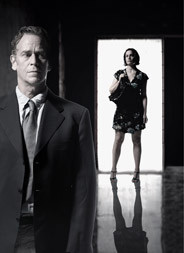 Much has been said about the topic of statutory rape. We all remember the Catholic priest plague. And, of course, there’s the story of Mr. Michael Jackson. But sometimes, far away from reality, the subject of rape grabs us in and takes us for a ride unlike anything we’ve ever encountered.
Much has been said about the topic of statutory rape. We all remember the Catholic priest plague. And, of course, there’s the story of Mr. Michael Jackson. But sometimes, far away from reality, the subject of rape grabs us in and takes us for a ride unlike anything we’ve ever encountered.
Such is the case with Theatre Exile’s production of David Harrower’s Blackbird. Commissioned for the prestigious Edinburgh International Festival in 2007, Blackbird has been on a tour de force, gaining high regards in both Scotland and New York.
The 80-minute play tells the story of Una and Ray, two lovers who find themselves face to face after 15 years. The ex-lovers attempt to retrace the steps leading to their parting and reconcile their feelings.
The reason for their reticent and guarded behavior was that Una was 12 years old and Ray was 41 when their relationship came to a screeching halt. Both parties throw around blame and torment – Ray served a six-year jail sentence while Una faced public scorn and humiliation. The couple was reunited after Una discovered Ray’s photo and contact information in a trade magazine and sought him out. The brilliance of the writing is in Una’s objectives. I, like the character Ray, sat at the Plays and Player’s Theater wondering why she had come.
Una, played wickedly by Julianna Zinkel, is a confused young woman who begins fidgety and nervous yet grows into a spiteful, vicious character, similar to Hedda Gabler or Abigail Williams. In a monumental monologue, Una shows us how deeply this ordeal has affected her and how she will never move on or grow up. During one piercing moment, Una accuses Ray of turning her into a ghost, knowing that neither of them would ever have independent, full lives.
Ray, played by Pearce Bunting, is a bit less complex in his secrecy but is no less thought provoking. I find the minds of the deranged much more fascinating – what makes them tick? What made them the way they are?
Bunting’s portrayal of Ray nailed that on the head. There are times when the audience hates Ray and others where they’re sympathetic. Bunting masterfully balances this man’s inner self-understanding, making him intricate and real.

Harrower, who won the prized Laurence Olivier Award, sets this unforgiving story in the stark familiarity of a messy office break room. The characters bicker (for a bit too long) before they realize what exactly they are doing and the roles they play in each other’s lives.
Blackbird’s director Joe Canuso, who is also Theatre Exile’s producing artistic director, created a powerfully honest world for the audience. The script’s dialogue creates a minefield of character-driven desires but one that rarely lends itself outside of reality. Canuso wisely embraced Harrower’s realism, making moments sharp and frank.
The set, designed by Matt Sauders, also lends itself to the idea of realism. The use of real fluorescent lights and a true-to-life set make everything seem more intense, more candid and more heartbreaking.
The ferocity that is Blackbird comes into focus when the audience realizes this story isn’t one of revenge or rekindled flings – it’s a love a story. Una and Ray are feeding off each other after 15 years of torment. The tension is high throughout as we watch two lives tumble down a mountain they knew and always hoped would come.
The characters in Harrower’s Blackbird are not just characters – they’re people. Harrower’s brilliance lies in making the people feel so real, so naked. As I exited the theater questioning the depth of all relationships, I was left feeling less real and less naked. That’s Blackbird.
Max McCormack can be reached at edwin.mccormack@temple.edu.



Be the first to comment